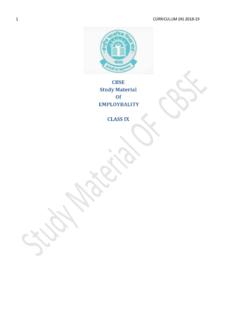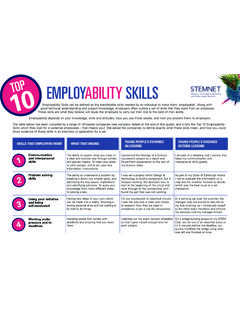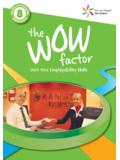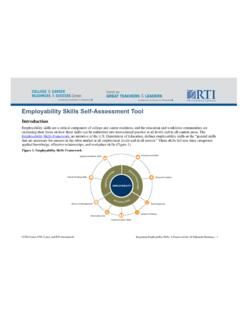Transcription of CORE SKILLS FOR WORK DEVELOPMENTAL FRAMEWORK …
1 core SKILLS FOR work DEVELOPMENTAL FRAMEWORKThe FrameworkDepartment of Industry, Innovation, Climate Change, Science, Research and Tertiary EducationandDepartment of Education, Employment and Workplace RelationsISBN 978-1-922125-42-2 DIISRTE 12/179 Thank you to all the stakeholders who helped in the development of this document by attending consultation sessions and providing expertise, feedback and suggestions. Commonwealth of Australia 2013 Department s of Industry, Innovation, Climate Change, Science, Research and Tertiary Education; and Education, Employment and Workplace work is copyright. It may be reproduced in whole or in part for study or training purposes subject to the inclusion of the source and no commercial usage or sale.
2 Reproduction for purposes other than those indicated above require the written permission from the Commonwealth. Requests and inquiries concerning reproduction and rights should be addressed to the Department of Industry, Innovation, Science, Research and Tertiary Education, GPO Box 9839, Canberra ACT CSfW was funded by the Commonwealth of Australia and developed by Ithaca Group Pty LtdThe views expressed in this document do not necessarily reflect the views of the Commonwealth of CSfW can also be accessed via the following websites and CONTENTSI ntroduction to the CSfW 1 Skill Areas 1 Influencing Factors 2 Background to the development of the CSfW 3 Purpose of the CSfW 4 Concepts underpinning the CSfW 5A DEVELOPMENTAL approach 5 Context-dependency 5 Relevance to a range of contexts 6 Structure of the CSfW 8 Using the CSfW 13 The Performance Features 13 The Influencing Factors 13 Performance Features Tables 151a.
3 Manage career and work life 161b. work with roles, rights and protocols 202a. Communicate for work 242b. Connect and work with others 292c. Recognise and utilise diverse perspectives 343a. Plan and organise 393b. Make decisions 423c. Identify and solve problems 463d. Create and innovate 503e. work in a digital world 54 core SKILLS for work | The FRAMEWORK | 1 INTRODUCTION TO THE CSFWThe core SKILLS for work DEVELOPMENTAL FRAMEWORK (the CSfW) describes a set of non-technical SKILLS , knowledge and understandings that underpin successful participation in work1. Participation in work could be as an employee, as someone who is self-employed, or as a set of non-technical SKILLS , often referred to as generic or employability SKILLS , contribute to work performance in combination with technical or discipline specific SKILLS and core language, literacy and numeracy (LLN) skills2.
4 As illustrated in Figure 1, work performance is also influenced by a range of factors relating to the context in which the SKILLS are being 1. core SKILLS FOR work IN CONTEXTS kill AreasThe CSfW describes performance in ten Skill Areas, grouped under three Skill Clusters:Cluster 1 - Navigate the world of worka. Manage career and work lifeb. work with roles, rights and protocolsCluster 2 - Interact with othersa. Communicate for workb. Connect and work with othersc. Recognise and utilise diverse perspectives1 The term work is used throughout the CSfW in the broadest sense of activity that is directed at a specific purpose, which involves mental or physical effort.
5 2 The combination of LLN SKILLS (as detailed in the Australian core SKILLS FRAMEWORK ) and core SKILLS for work is referred to as Foundation SKILLS in the Vocational Education and Training Sector. In the school sector these two types of SKILLS are described as General Capabilities and in the higher education sector they are referred to as Graduate Attributes. core SKILLS for WorkTechnical orDisciplineSpecific SkillsContextLLN SkillsWork PerformanceCore SKILLS for work | The FRAMEWORK | 2 Cluster 3 - Get the work donea. Plan and organiseb. Make decisionsc. Identify and solve problemsd. Create and innovatee. work in a digital worldEach Skill Area describes a combination of knowledge, SKILLS and understandings and their application to CSfW recognises that these Skill Areas are relevant to all those undertaking work , not just those entering the workforce for the first time, and that they can continue to be developed across the span of an individual s working life.
6 The CSfW describes performance in each of the Skill Areas across five stages (see page 9). It also recognises that: the particular SKILLS and stages of performance required by individuals will vary according to the context in which they are operating there is no expectation that individuals will necessarily need all of these SKILLS , or will need to develop them to the expert stage of performance an individual is likely to be operating at different stages of performance across different Skill Areas an individual s ability to demonstrate and develop these SKILLS will be influenced by the context in which they are FactorsIn recognition of the fact that performance in these Skill Areas is context-dependent.
7 The CSfW identifies a number of factors that impact upon the development and demonstration of core SKILLS for work . Performance in a work situation is not only dependent on the SKILLS and knowledge that an individual brings to it, but on a range of factors that may affect how well they can apply these to different tasks. Contextual factors also affect an individual s capacity to demonstrate certain SKILLS or to develop them further. For example, someone may have highly developed decision-making SKILLS , but if they are not given the autonomy or their job role does not require them to exercise these SKILLS , their demonstrable performance in this Skill Area may reflect a lower stage performance.
8 These Influencing Factors are illustrated in Figure 2 (see page 3) and described in detail in Table 4 (see pages 11 12). core SKILLS for work | The FRAMEWORK | 3 Figure 2. FACTORS INFLUENCING work PERFORMANCEBACKGROUND TO THE DEVELOPMENT OF THE CSFWThe notion of employability has been part of education for many years. In the early 1990s, the concept of employment-related SKILLS gained traction in Australia when the Mayer Committee examined the SKILLS required for entry-level employment. The Mayer Key Competencies were developed to enable the incorporation of these SKILLS into education and training. In 2002, Australian industry took a lead role in describing the SKILLS required to gain and progress in employment.
9 These employability SKILLS were identified in the Employability SKILLS for the Future report, prepared by the Australian Chamber of Commerce and Industry (ACCI) and the Business Council of Australia (BCA) with funding from the Commonwealth Government. The Employability SKILLS described in that report were taken up in Australia s vocational education and training sector, but concerns remained about how well these SKILLS were being developed and understood. Consultations in Stage One of the CSfW development identified that there was potential for a new FRAMEWORK to provide a common language that would assist all education, training and employment services sectors to address these SKILLS more explicitly.
10 The development of the CSfW drew upon recent research about employability and generic SKILLS and their development, as well as analysis of a range of current approaches to addressing employability and generic SKILLS in Australia and overseas. More than 800 people had input into the development process, including employers, unions and industry groups and a broad cross-section of organisations and sectors that have an interest in, and potential use for, the CSfW, as described in this document, is intended to be reviewed after a number of years of use to check whether it would benefit from adjustment or further skillsand knowledgeExternal factorsCultural andvalue-basedfactorsDegree of motivationNature anddegree ofsupportLevel ofautonomyComplexityof tasksFamiliaritywith contextSelf-beliefand resilienceDemonstrablePerformanceCore SKILLS for work | The FRAMEWORK | 4 PURPOSE OF THE CSFWThe CSfW has been designed to make more clear and explicit a set of non-technical SKILLS and knowledge that underpin successful participation in work .








